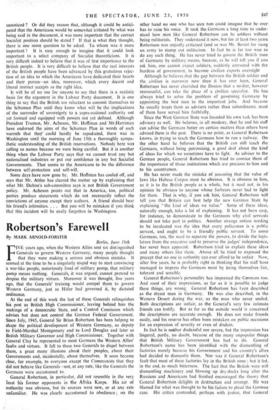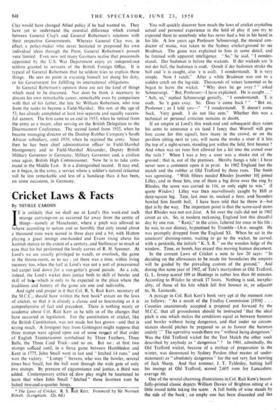Robertson's Farewell
By MARK ARNOLD-FORSTER
Berlin, June 19th
FIVE years ago, when the Western Allies sent six distinguished Generals to govern Western Germany, many people thought that they were making a serious and obvious mistake. It seemed at the time to be a singularly stupid way to start convincing a war-like people, notoriously fond of military pomp, that military pomp means 'nothing. Generals, it was argued, cannot pretend to despise the military virtues. Moreover it was thought, five years ago, that the Generals' training would compel them to govern Western Germany, just as Hitler had governed it, by dictated ordinance.
At the end of this week the last of these Generals relinquishes his post as British High Commissioner, leaving behind him the makings of a democratic State, and a Control Comission which advises but does not control the German Federal Government. Since July, 1945, General Sir Brian Robertson has been helping to shape the political development of Western Germany, as deputy to Field-Marshal Montgomery and to Lord Douglas and later" as British Military Governor and High Commissioner. Together with General Clay he represented to most Germans the Western Allies' faults and virtues. It fell to these two Generals to dispel between them, a great many illusions about their peoples, about their Governments and, incidentally, about themselves. It soon became clear, for example, to everyone except the Communists that they did not behave like Generals—not, at any rate, like the Generals the Germans were accustomed to.
General. Robertson, in particular, did not resemble in the very least his former opponents in the Afrika Korps. His air of authority was obvious, but its sources were new, or at any rate unfamiliar. He was clearly accustomed to obedience ; on the other hand no one who has seen turn could imagine that he ever has to raise his voice. It took the. Germans a long time to under- stand how men like General Robertson can be soldiers without being militarists. They understand it now, but for at least two years Robertson was unjustly criticised (and so was Mr. Sevin) for using an army to stamp out militarism. In fact he is far too wise (0 do any such thing. He has never tried to govern the British zone of Germany by military means, because, as he will tell you if you ask him, one cannot expect soldiers, suddenly entrusted -with the burdens of government, to become civilian experts overnight
Although he believes that the gap between the British soldier and the civilian is narrower now than it has ever been, General Robertson has never cherished the illusion that a soldier, however resourceful, can take the place of a civilian specialist. He has always tried to solve the problem of governing Germany by appointing the best men to the important jobs. And because he usually treats them as advisers rather than subordinates, most of them have served him faithfully.
Since the West German State was founded his own task has been advisory as well. He believes, in all modesty, that he and his staff can advise the Germans better on certain matters than others have advised them in the past. There is no point, as General Robertson knows, in trying to teach the Germans how to run a railway. On the other hand he believes that the British can still teach the Germans, without being patronising, a good deal about the kind of ideas for which we sometimes have to fight. As adviser to the German people, General Robertson has tried to convice them of the importance of those institutions which are precious to him and to his countrymen.
He has never made the mistake of assuming that the value of laws like Habeas Corpus must be obvious. It is obvious to him, as it is to the British people as a whole, but it need not, in his opinion be obvious to anyone whose forbears never had to fight for them. That is why, if you ask him, General Robertson will tell you that Britain can best help the new German State by explaining " the kind of ideas we value." Some of these ideas, naturally enough, take a lot of explaining. It has not been easy, for instance, to demonstrate to the Germans why civil servants should not take part in politics. Another strange notion needing to be inculcated was the idea that every policeman is a public servant, and ought to be a friendly public servant. To some Germans, too, the need to separate the powers, to divide the legis- lature from the executive and to preserve the judges' independence, has never been apparent. Robertson tried to explain these ideas and many others like them. Above all he tried to expound the precept that no one in authority can ever afford to be unfair. Now, after five years, he is probably right in thinking that his staff have managed to impress the Germans most by being themselves fair, tolerant and sensible.
General Robertson's personality has impressed the Germans too. And most of their impressions, as far as it is possible to judge these things, are wrong. General Robertson has teen described as the shyest man in Germany. He was also described, in the Western Desert during the war, as the man who never smiled. Both descriptions are unfair, as the General's very few intimate friends can testify. But as far as the outside world is concerned the descriptions are accurate enough. He does not make friends easily, and his reserve has often been mistaken on public occasions for an expression of severity or even of disdain.
In fact he is neither disdainful nor severe, but the impression has lingered, partly, no doubt, because of the many unpopular things that British Military Government has had to do. General Robertson's name has been identified with the dismantling of factories merely because his Government and his country's allies had decided to dismantle them. Nor was it General Robertson's fault that most of these factories lay in the British zone ; but it led, in the end, to much bitterness. The fact that the British were still dismantling machinery and blowing up dry-docks long after the Russians and Americans had finished encouraged the theory that General Robertson delights in destruction and revenge. He was blamed for what was thought to be his failure to plead the German• case. His critics contended. perhaps with justice, that General
Clay would have changed Allied policy if he had wanted to. They have yet to understand the essential difference which existed between General Clay's and General Robertson's relations with their respective Governments. Whereas General Clay was, in effect, a policy-maker who never, hesitated to propound his own individual ideas through the Press, General Robertson's powers were limited. Even now not many Germans realise that proconsuls appointed by the U.S. War Department enjoy an independence seldom granted to servants of the British Foreign Office. It is typical of General Robertson that he seldom tries to explain these things. He sees no point in excusing himself for doing his duty, or his Government for fulfilling its international obligations.
In General Robertson's opinion these are not the kind of things which need to be discussed. Nor does he think it necessary to discuss his own remarkable career, remarkable even by comparison with that of his father, the late Sir William Robertson, who rose from the ranks to become a Field Marshal. 'His son; at the age of 53, has already completed at least two separate and equally success- ful careers. The first came to an end in 1933, when he retired from the army as a major, after serving on the British Delegation to the Disarmament Conference. The second lasted from 1935, when he became managing director of the Dunlop Rubber Company's South African subsidiary, until 1939, when he rejoined the army. Since then he has been chief administrative officer to Field-Marshal Montgomery and to Field-Marshal Alexander, Deputy British Military Governor in Germany, Military Governor and, a civilian once again, British High Commissioner. Now he is to take com- .mand in the Middle East. It is a distinguished record. It may end, as it began, in the army, a service where a soldier's natural reticence . will be less remarkable and less of a handicap than it has been, on some occasions, in Germany.



































 Previous page
Previous page